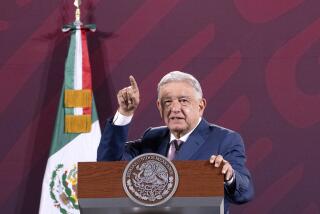Latins Agree on Treaty-Monitoring Units
- Share via
PANAMA CITY — After two days of talks, delegates to Central American peace negotiations here agreed Friday night to establish three panels to monitor compliance with the provisions of a future regional peace treaty, a final communique said, but they failed to agree on crucial questions of procedure.
The decision represented one of the most concrete achievements in more than two years of talks sponsored by the Contadora Group, four Latin American nations seeking settlement of Central American conflicts through mediation and diplomatic negotiations. But a final plan remains a distant objective.
The three panels, to be composed of representatives of nations that are neither part of Central America nor of the Contadora Group, would monitor compliance in three areas: security issues, economic and social issues and issues involving internal politics and refugees.
“These mechanisms will guarantee the conditions of effectiveness, independence and impartiality to which the process of negotiation sponsored by the Contadora Group has always aspired,” the negotiators said in a communique.
The Contadora Group is made up of Mexico, Colombia, Panama and Venezuela and takes its name from the Panamanian resort island where they held their first meeting in January, 1983.
Two years of intermittent negotiations by the Contadora Group with the Central American nations of Guatemala, El Salvador, Honduras, Nicaragua and Costa Rica have helped slow the spread of conflict in the region, but mutual animosities and distrust have kept the parties far apart on a final peace treaty.
The current round of talks focused on a plan to establish an agency to monitor compliance with security commitments, even though the commitments--how many arms and soldiers each country can possess--have yet to be clearly defined.
Nicaraguan Disappointed
Victor Hugo Tinoco, Nicaragua’s deputy foreign minister, said afterwards that the talks were a disappointment because his country’s offer to adopt a broad plan put forward by the Contadora Group was rejected by El Salvador, Honduras and Costa Rica.
At issue, he said, are details of how the monitoring agencies would operate and what rights they would enjoy. Nicaragua’s three principal opponents, he said, want a peacekeeping force of a military nature, which Nicaragua rejects.
The question of whether the monitoring groups’ activities would be governed by a majority vote of the Central American nations, or whether any country could exercise a veto, is also undecided, he said.
“We consider that these talks represent an advance, of course, but we did not get as far as we had hoped,” said Tinoco.
Communique Quoted
Exemplifying the enmity and suspicion that continue to infect the talks, Tinoco charged that El Salvador, Honduras and Costa Rica were acting as stalking horses for the Reagan Administration to block the Contadora process.
Diplomats from the other countries left the meeting hastily and were not available to reply to Tinoco.
The final communique said that agreements reached here “reflect the principles of respect for nonintervention in the internal affairs of nations, self-determination and peaceful resolution of international conflicts.”
Tinoco described this as a veiled rejection of the policy of the Reagan Administration in Central America, which he characterized as “bellicose” and oriented against negotiations.
The Latin Americans decided to meet again during the first half of May to try once more to reach agreement on the overall issue of verification and control.
More to Read
Sign up for Essential California
The most important California stories and recommendations in your inbox every morning.
You may occasionally receive promotional content from the Los Angeles Times.










